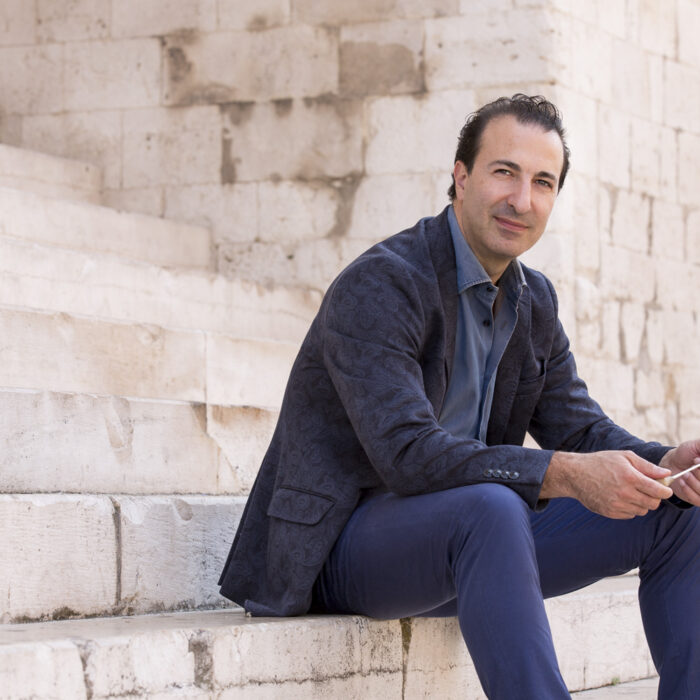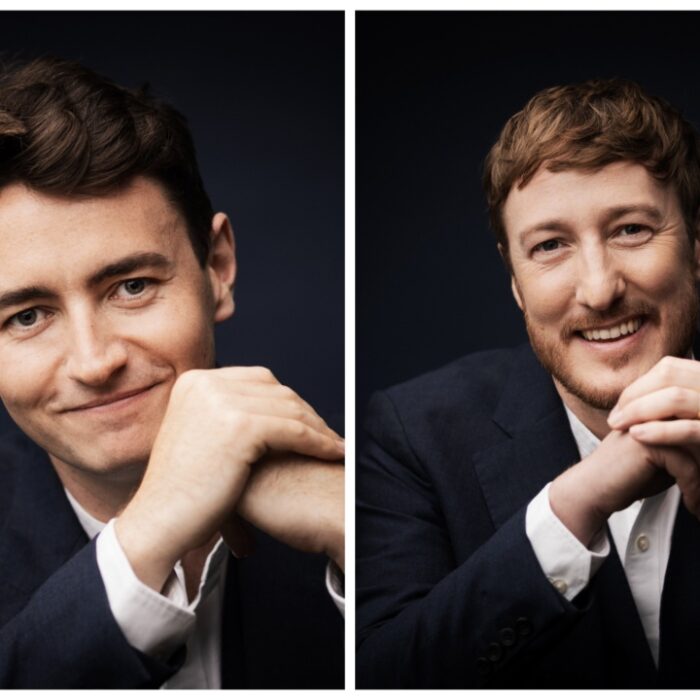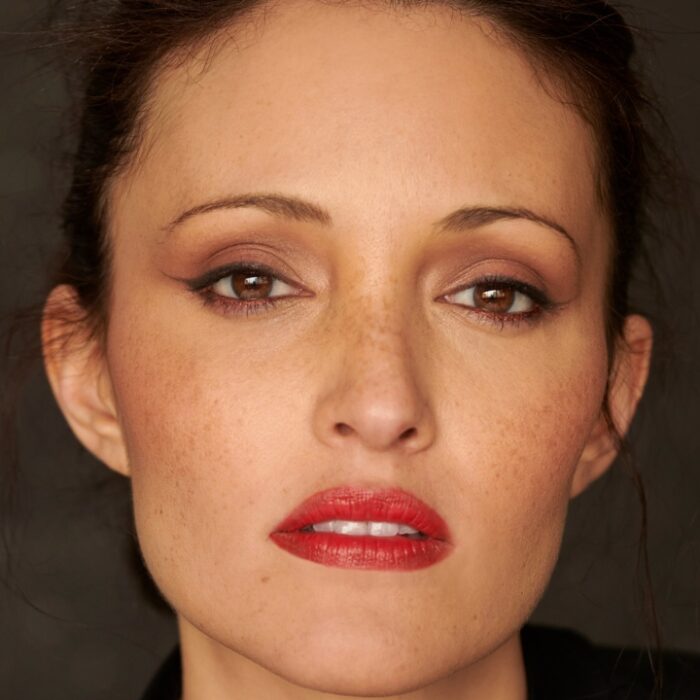
Q & A: Composer Zaid Jabri on the Process of Composing ‘Southern Crossings’
By David SalazarOn June 16 and 18, 2022, audiences in New York City will get the opportunity to witness the world premiere of “Southern Crossings.”
The work, set to a libretto by Yvette Christiansë and Rosalind Morris, centers on the story of the meeting between famed astronomer John Hershel and Charles Darwin and how different characters experienced and hoped that that meeting would have gone. The opera will be directed Crystal Manich and conducted by Mark Shapiro.
At the center of it all is the music of Syrian-born composer Zaid Jabri. Jabri trained in Poland at the Academy of Music and his works have been performed all around the world with such organizations as the Kremerata Baltica, the English Chamber Orchestra, Ensemble Zeran, the Orchestra of the Teatro Comunale Bologne, the Polish National Radio Orchestra, and the Syrian National Symphony Orchestra, among many others.
OperaWire had a chance to speak to Jabri about his experience in composing “Southern Crossings” and what he hopes audiences will take away from the new opera.
OperaWire: What inspired creation of Southern Crossings? What about these characters did you hope to explore? What did taking on this work reveal about figures such as Charles Darwin and John Herschel?
Zaid Jabri: Rosalind Morris and Yvette Christiansë, the librettists, had the story in mind for a long time, I received the first scene and after a few readings I had the feeling that the libretto is very rich emotionally and historically and has the potential of a great opera.
I went back to books, “On the Origin of Species,” “The Voyage of the Beagle,” and I started my research on John Herschel, his father’s telescope and music compositions, Cape Town and Table Mountain, and the story of Hintsa Ka Phalo who’s head is said to have been sent to England, or at least that he was mutilated by British soldiers. I listened to the languages of the Cape, and the clicks of the Khoenkhoen, isiXhosa and isiZulu languages, and I used them in few places where Darwin mentioned the clicks of other languages.
The decisive moment was when Yvette Christiansë showed me some archival documents of slave trade, old documents with the name, the number, the age of each. And I said to myself those are people! We can’t live without memory and it’s a story that has to be told.
OW: What is your personal process for composing an opera? How does it compare to your process in composing other works?
ZJ: Usually I start by reading the text many times, exposing the meaning of the words, the general mood, the prosody and the time and space. Is it the garden where we hear the birds during the day or is it the night where we might hear the hyenas? What is the emotional world for each character at the moment that they speak or sing? The music needs to help with the general mood. I map the scene by drawing with colors each part of the scene, sketching out the tempos I will use and what kind of harmony/ melody/ polyphony.
When I compose, I never write from the beginning to the end. I choose a few very important moments in the piece or the opera to start with, but this time I did write the opera from the beginning to the end because the libretto wasn’t done when I started. I was in Paris as a fellow at the Institute for Ideas and Imagination when I wrote the music, receiving the libretto from the librettists as I went. I was very fast in the process and curious about the story, wanting to know what would happen next in the story, what happened during that extraordinary meal between Darwin and Herschel?
OW: What is the greatest challenge of composing an opera?
ZJ: The challenge with this opera is in scene four, when the two scientists meet in the garden. The language of science which I never saw or even imagined could be used in singing, The discussion goes for a long time until suddenly we land in Leah’s aria, which changes the whole scene and brings us back to simple and honest words and musical atmosphere, before going back to the scientists. Leah’s aria arrives when we really need it; the discussion goes so deep into the world of planets and species until we get to a moment when we can’t even breathe.
When writing, I imagine myself as the character and try to understand the emotions and the inner world of the character. I imagine the character in the scene and think, in what register the word should be sung or said, what might be the body language. I imagine the light and location of each the scene.
To write opera you have to love opera, respect the libretto and try to express what is in it. You have to organize the time and narrative, give the singers, the players, the conductor and the director some space to spread their wings and find solutions. The score is just notes and words and it is not the opera yet.
It is a wonderful form of art, and each performance is different and unique in its interpretation.
The process of thinking is usually long and when it’s done, the process of writing is very short if the composer has the craft and experience.
OW: How would you describe the musical language for this work? How did you arrive at the specific music language of this opera?
At either extreme, we basically have two musical languages: the language of the scientists and the language of people (servants) Leah and January. One is chromatic, sophisticated and the other is simple and honest: the language of scientists who see, follow the comet’s tail and people who see the future in a comet’s tail, the scientists who call it the Southern Cross and people who call it an ant’s egg, the scientists who study the origin of species and people who live with creatures and enjoy the sounds of the birds, the language of thinking and the language of feeling.
In scene three we also have a duet of Margaret Herschel and Leah, and we start to discover the inner world of Margaret, who worries about the servants when she and John Herschel will leave the Cape, while Caroline, in Hanover, is losing her eye sight (she had been struck with typhus).
Leah and Margaret both talk about that awkward evening, that dinner in which Darwin was telling stories about a boy bought for a button and a girl named Basket. We feel that they are both so sensitive and human until we hear January comparing the ransacked Indian tombs with Hintsa’s head. In that moment, Margaret thanks God that John Herschel looks to the sky, and is not guilty of violation, invasion, trespass.
I try not to limit myself to one compositional technique. In this opera I used aleatoricism, microtones, sonorism, heterophony. I use the technique when I need it and never use it just for using it, because I believe that the technique should serve the music, communicate the story.
The chorus is not only singing words but also singing the inner emotions of the characters. They are sounding the rain frogs, the hyenas and the beautiful non-singing roles in the scenes that Crystal Manich managed to create with the chorus
The orchestration is for six soloists, a chorus, accordion, string quartet and small percussion instruments, including a water-phone. In fact, I had to create the notation for this specific instrument, I had to measure the hertz of each rod while playing on top or on the bottom, forte or piano: 34 rods and each is so rich in harmonics with its beautiful glissandos caused by the water inside the instrument.
The accordion I am using is a button classical accordion that can be a full wind ensemble with a very wide range in register and can produce beautiful bass and wonderful clusters, it has a role similar to figured bass in Baroque opera and the accordionist, Maciej Frąckiewicz is a wonderful virtuoso player whom I worked with in Poland years ago.
The music is new but the story is old and it is still ongoing—a story about slavery and inequality and social justice. Each scene is different, it has its own sonic and emotional world, but the whole creates one unit.
OW: What was it like to work with Rosalind Morris and Yvette Christiansë?
ZJ: I worked in the past with Rosalind Morris and Yvette Christiansë on a large scale opera “Cities of Salt” (four scenes were showcased at the Linbury Theater, ROH Covent Garden, but it is still in process). With Yvette, I also worked on several other pieces, including: “A Garden Among the Flames” for two soloists, chorus and symphony orchestra, conducted by Mark Shapiro at Carnegie Hall in 2017.
Mark will also conduct our opera and is doing wonderful work with Crystal Manich during the rehearsals. “Variations on (R)evolution for mezzo soprano,” violin and piano has a text by Yvette Christiansë, and it premiered during Beethovenfest in Bonn 2018; and “Hemispheres” was performed in Essen Philharmonic in 2021.
I can say it’s a pleasure and we understand each other. Nothing is fixed and we are flexible. When I need to change a word or add an aria, I always ask them and we do it, I keep them up to date in what I am doing and we discuss if it works or not and we always generate a solution together.
I think that we understand each other because we share the same ethical values.
OW: What do you hope that audiences take away from this work? What kind of experience do you want them to have?
ZJ: When I see any work of art—a movie, an opera or an exhibition—and it stays in my mind and makes me think, it means that the art works. I am thinking about it and there is something in it that provoked me and this is my hope for “Southern Crossings,” that audiences will see both worlds, the struggles of science and social justice, and they will understand that science without ethics can be devastating.
OW: Your works have been performed all over the world. How has your interactions with different audiences and cultures inspired or shaped your voice / style / approach as a composer?
When I listen to music, I try to forget that I am a composer (even listening to my own music) and I believe that’s a good approach. It allows the music to come to me without any burdens and I try to do the same with the audience. I have huge respect for the audience and for the performers, and believe that my respect makes them respect my music, so it’s mutual, but of course when I teach it’s a different story. I have to analyze and discuss precisely the piece of a student.
In some countries contemporary artistic music does not exist, but always there are groups of people who are interested in it.
I had four performances of a new piece in Serbia (Horror Vacui) for 15 violins and five violas, commissioned by Novi Sad-based Violint Ensemble. Serbia is a country that was not part of the Warsaw Pact or NATO during the cold war, or a part of either of those worlds in politics and in music and art. The ensemble I worked with had never played a piece like that, with microtones, sophisticated rhythmic combinations and multi-layered textures.
At the beginning it was so difficult for them to play but after some explanation and work, they started to like it and even to love it. The audience was positively surprised and we performed the piece in four towns including Novi Sad.
Damascus has a conservative audience. When they performed my Clarinet Concerto in 2004, I heard some harsh words from the players after each rehearsal, but one month after the premiere, they started to commission new pieces.
I don’t believe in any kind of guardianship. Let the audience hear everything and go through the experience of listening. They might love or hate it, and both are good, at least it provokes them.


